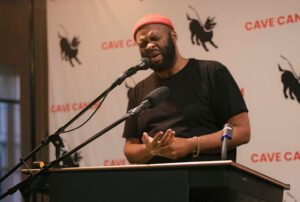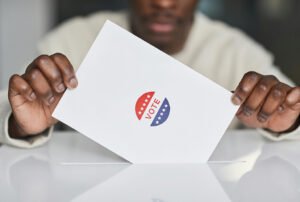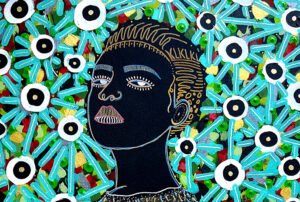Dr. Nicholas Harvey initiated a series at Edge Leadership entitled Policy for Liberation. The purpose of the event is to discuss hopes, fears, dreams, and aspirations for Black liberation in US policy. In this excerpt, Dr. Harvey interviews Dr. Robert Franklin on policy for liberation.
Dr. Nicholas Harvey: Greetings, family, and welcome to the Edge Leadership forum, Policy for Liberation. Founded by Cindy Suarez, president and editor-in-chief at Nonprofit Quarterly, Edge Leadership is a cross-sector network that is designed for leaders of color, creating new forms for a livable future. I’m Nicholas Harvey, president and CEO of Nicholas Harvey Consulting and former visiting assistant professor in the Public Management and Policy Department of the Andrew Young School of Policy Studies at Georgia State University. Our guest today is a noted public intellectual and public theologian, academic administrator as the tenth president of Morehouse College and sixth president of the Interdenominational Theological Center, a former Ford Foundation program executive, author, mentor, and friend. The Reverend Dr. Robert Michael Franklin Jr. serves as the inaugural chair of the James T. and Berta R. Laney Chair in Moral Leadership at Emory University.
Beyond his esteemed credentials and contributions in the public sphere, I invited him here as a point of personal privilege, because of who he is in my life. We met while I was a graduate student at Emory University’s Candler School of Theology as he came to Atlanta to serve as the founding director of the Black Church Studies Program. He introduced me to the terms “scholar pastor” and “public theologian,” which demanded that, as a part of our calling, faith leaders must use their intellectual gifts to address the complexities of our human existence, not merely for the “sweet by-and-by,” but for the nasty now. Policy scholars are familiar with Aaron Wildavsky’s work, Speaking Truth to Power: The Art and Craft of Policy Analysis. Dr. Franklin challenged us to speak truth to power both inside and outside of our communities of faith. In today’s terms, while we care for those impacted by the coronavirus pandemic, we will also confront the systems and structures that made an unequal opportunity syndemic.
It is my honor to present to you my friend, the Reverend Dr. Robert Michael Franklin Jr. Welcome, Robert. How are you doing today?
Rev. Dr. Robert Franklin: Thank you very much, Nick. I’m delighted to be with you. I’ve looked forward to our conversation. And please do refer to me as “Robert” going forward.
Dr. Harvey: Surely, surely. So, tell me, as we think about policy for liberation, what comes to mind for you?
Sign up for our free newsletters
Subscribe to NPQ's newsletters to have our top stories delivered directly to your inbox.
By signing up, you agree to our privacy policy and terms of use, and to receive messages from NPQ and our partners.
Dr. Franklin: “Policy for liberation.” Policy is a means that enables the end of liberation. There are numerous means; we can talk, and we will talk about that. Various institutional practices: individual practices, such as, for instance, civil disobedience; group practices, like protest and social movements; but also deliberations about the promises that government institutions—and, for that matter, we could also talk about, although this isn’t specifically covered by public policy, the behavior of companies and corporations, which I think needs to be an increasing part of our conversation because of the disproportionate power that corporations wield in contemporary democracy.
In any case, all those are means to certain ends, and I think that policy represents one of those…I’ll say easy-to-access, easy-to-influence means of changing government practice and promises to the people.
Dr. Harvey: So, I appreciate what you share, even though our basic definition of public policy is what government does or does not do, but that broader understanding that in the midst of policy development, corporate policy is what corporations might choose to engage in or not, particularly in this season where there’s a reckoning at a number of levels with regard to social justice for clients, customers, consumers and the like, as well. Yes?
Dr. Franklin: Absolutely. Absolutely. And one of the exciting things that I think, you know, we’ve taken for granted a long time, but—I’m excited to see how students, how younger people recognize immediately that the mobile device they carry in their purse or pockets, and the provider, the carrier, the company from whom they purchased those technological gadgets, really have some moral and social obligations to their consumers and to the larger public. And we can exercise, they can exercise influence on the behavior of the Samsungs and the Apples and Googles of the world by cooperating, supporting, or not doing so—withdrawing support, withdrawing dollars, boycotts, etc. And I think that that connection between the people’s voice, the people’s movement, and action, and public policy or government—and, here again, or corporate behavior—is so important at this time, as you named it, of reckoning. I think this is a period of American reckoning. And one of the wonderful dimensions of the reckoning is the recognition of the people’s power, the people’s ability to influence policy and law.
And, of course, the most important—I have to say this, we’re still just ten months away from the death of John Lewis last July, of 2020—is the importance of being willing to take personal risks for the common good. And of course, John Lewis talked about that as “making good trouble”—not sitting by and watching bad things happen to innocent people. That you have, as he put it, an obligation to speak up, to speak out, to act up, and act out if necessary to ensure that justice be done. Back to the top of the program, that liberation is the goal. And for me, that’s about full participation in the benefits and the burdens of American citizenship and the blessings of this democracy.
Dr. Harvey: Surely. And do you think that we have the understanding that with these devices, for instance, that some might use for a flash mob? Well, that can be called for a “flash gathering” down at the state capital, right? Understanding that there are issues which many people may or may not know, depending upon the locus of their communities, but then it can be used to say, you need to pay attention to this. You know, the thing about for how long the water crisis in Flint, Michigan was going on, and no one knew about it. Even the challenges in our own home, the city of Atlanta, with our own water department and the infrastructure and lead pipes, using those devices, and I think that helps to make it accessible from the idea of policy salience. You know, that understanding that nothing, meaning from a policy perspective, is achieved just by the march. It’s been what happens subsequently, after that, and keeping people involved, and engaged, and in touch, and enlightened with a given movement.
Edge Leadership began in 2020 with a series of in-person and online convenings. This article and multimedia story series features the thinking of Edge Leaders. Follow these talented, sector-crossing, forward thinking social change agents at @EdgeLeadership2020 on Instagram, via NPQ’s channels, and by joining our online platform experiment.













